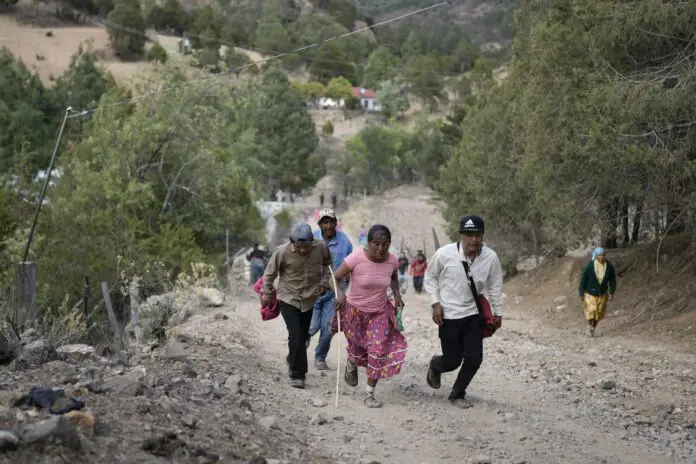Miguel Lara was born to run. It’s an inherent part of his culture, passed down through generations of Tarahumaras. This Indigenous community from northern Mexico has been running for centuries, long before marathons existed.
Lara, 34, is an ultramarathoner who embodies this tradition. He lives in Porochi, a remote mountain community where the lack of vehicles and basic services has made running a necessary part of daily life.
“We run because we love to,” Lara said, rejecting any sponsorship or commercialization of his talent. “We do this for the thrill of running.”
For Lara and his wife Maribel Estrada, running is a way of life. They have two children, aged 3 and 11, who often join their parents on runs through the mountains.
In fact, running is almost sacred among the Tarahumaras. Local communities organize competitions as part of religious ceremonies, where runners compete not for personal glory but to represent their community.
One such celebration took place in Cuiteco, where dozens of Tarahumaras danced and prayed for good crops and safety. During this Yúmari ceremony, 13-year-old Evelyn Rascón competed with one of the women’s teams, vying to break her own record.
Rascón, who started running at age 6, has only run half marathons professionally, but she dreams of covering longer distances faster than two hours. Her stepmother Teresa Sánchez, a top runner during Yúmari, prefers to wear rubber sandals with leather straps, a traditional choice among Tarahumaras.
Lara’s story is one of endurance and passion for running, which he credits to his upbringing in the mountains. “When I was a kid, I watched elders running for hours and wondered: How can they endure for so many kilometers? Couldn’t I do the same?” he said.
For Lara, running is not just about physical achievement but also about spiritual connection with his community and the land he calls home.
Sánchez’s dedication to running is reflected in her choice of footwear – rubber sandals with leather straps, which she wears every day and replaces only after 2-3 years. Her love for running was inspired by her mother, also an avid runner, who taught her that strength comes from working the land.
For Sánchez, like many Tarahumaras, the connection to their ancestral lands is a fundamental part of their identity. “The Earth is our mother because she provides us with everything,” said Candelaria Lechuga, an Indigenous woman who participated in the Cuiteco race. The community’s closeness to nature is rooted in their culture, which values simplicity and self-sufficiency.
Michael Miller, a foreign ultramarathoner who has befriended the Tarahumaras, appreciates the community’s resilience in the face of adversity. “They’ve faced centuries of challenges – cartel violence, logging, drought – yet they still maintain their connection to the Earth,” he said. “That’s the wisdom we outsiders must understand and respect.”
The Tarahumara culture has also inspired American athlete Michael Randall Hickman, known as Micah, who befriended some local runners at a race in Colorado. He eventually moved to the mountains and spent his life among the locals, learning from them and sharing their values.
Lara, a renowned ultramarathoner, credits Micah’s advice – “Compet with yourself – Break your own record.” Lara’s (True Messages: – Michael Miller Hickman Hickah Miller”)) for his success and has won several international races.
However, despite achieving global recognition, he always remains rooted in his community. “I’ve never thought about moving to another country,” he said. “We Tarahumaras are not used to cities.” Lara still lives near the mountains where his mother, who became a runner and shared her wisdom with him.
When he is not racing against international champions, Lara does construction work in nearby villages and raises crops that feed his family. This is where his mother taught him what it means to be a runner: “She didn’t tell me how many kilometers to run,” Lara said. “She told me what I would feel while running, what I would suffer.”
At the beginning, his mother warned him: You’ going to get hungry and thirsty after two or three hours, eight or nine hours later, you’ll need to ignore cramps because if you sit down, they will hit harder.
Endurance is key. He has no rituals before a race but always turns to God for protection “I ask him to take care of me and allow me to get safely to the finish line even if I don’t win.” Injuries are common among long-distance runners, Lara said, which makes him hesitate to encourage his youngest admirers to follow in his footsteps. He asks his children to be patient, to grow up a bit more before becoming long- distance runners like their ancestors.
They nonetheless wait near the finish line at local races he usually wins “They feel the thrill and run the last five or ten kilometers with me.” They also have their own running club, where they can share their experiences and learn from each other.
Source: AP News







